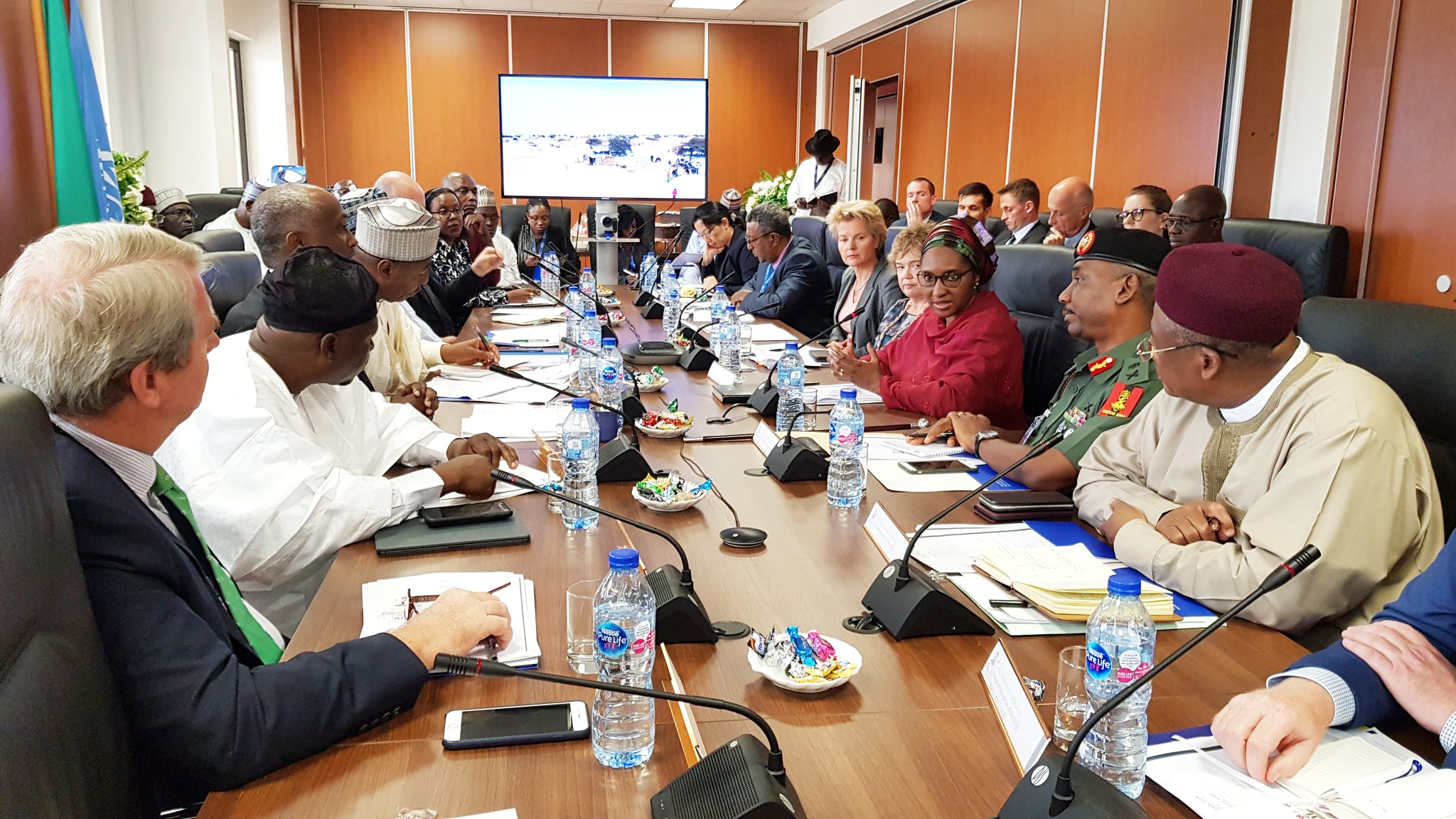Key stakeholders at the first board meeting for the regional stabilization facility (Nigerian Window)
UNDP convened the inaugural Board Meeting for the 'Nigeria Window' of the Regional Stabilisation Facility which is aimed at providing a rapid response package to support immediate stabilisation in the three states affected by the Boko Haram insurgency. The Meeting which was held in Abuja, was co-chaired by Hon. Minister of Finance, Budget and National Planning Hajiya Zainab Ahmed and UNDP Resident Representative Mr. Yahya Mohamed, had in attendance the three Governors from the affected states such as Adamawa, Borno and Yobe among other dignitaries.
The Regional Stabilisation Facility, anchored within the Regional Stabilization Strategy (RSS) for Lake Chad, is a ground-breaking initiative led by the Lake Chad Basin Commission (LCBC) and adopted by its Member States in August 2018, and endorsed by the African Union Peace and Security Council in December 2018, which was launched in July in Niamey, Niger at the second Governors Forum. The Facility is has been established with the aim of rapidly contributing supporting to the affected regions of Nigeria, Niger, Cameroon and Chad within the Lake Chad Basin.
Key stakeholders from around the country gathered in Abuja for the first board meeting for the regional stabilization facility for Lake Chad. The aim of meeting which held on Friday, September 20, 2019 was to discuss the Facility's rapid response package and priorities aimed at stabilizing communities in the North-East that have suffered from a decade-long Boko Haram insurgency.
The crisis in Lake Chad has led to the increase in number of displaced persons, causing each of the affected countries to devise its own strategy on how to cope with the humanitarian challenges.
The Nigerian window for the regional stabilization facility was launched by UNDP in partnership with the Lake Chad Basin Commission (LCBC) during the 2nd Governors forum meeting on 18th of July 2019 in Niamey, Niger Republic.
Speaking at the board meeting, the UNDP Resident Representative, Mohamed Yahya called on all stakeholders to participate equally to ensure the stability, peace and sustainable development in the regions.
He said: “Most of you know that the Nigerian window is part of the Lake Chad Basin Commission (LCBC) strategy adopted last year. The purpose of this meeting and your presence as board members is to join us in the review and appraisal of the strategic direction for the Nigerian window. Despite the tremendous efforts on recovery and humanitarian assistance in the region, this work that we will embark on is one with high risk as we are going to be operating in places that for years has experienced insecurity, but the opportunities exist hence why we are engaging in this stabilization.
"I can assure you that from my work with the states, there is no doubt in terms of the commitment but more work needs to be done in terms of coordination and we need to do better going forward. We are very lucky to have you all here and we look forward to working with you in the next years as we embark on this adventure together.” he said
While giving his remarks, the Governor of Borno State, Babagana Zulum emphasized that the most important agenda for this facility will be to address the root causes of the Boko Haram insurgency which are not limited to poverty, basic illiteracy, high unemployment rate, social inequality, poor social and economic infrastructure.
Governor of Yobe State, Hon. Mai Mala Buni stated that he is certain that the stabilization facility will complement efforts of all stakeholders by providing some sense of hope to the people. “We are confident that we would be in a position once again to provide the qualitative education that our children needed, the healthcare that is so vital to the wellbeing of the people, the agricultural support that would boost food security and the empowerment that our youths needed to become responsible citizens.”
The Governor of Adamawa State, Alh. Ahmadu Finitri noted the tremendous efforts being made by the various UNDP country offices to kick-start the implementation of the regional stabilization strategy through the facility in order to provide immediate help and support to the affected people in the region. He stated that Nigeria is the worst hit country, with the biggest humanitarian needs of all the affected countries. It is therefore expected that Nigeria should commit fully not only in the fight against boko haram but also in ensuring that the thousands of people affected across the three frontline states are supported to live a life of dignity.
Key among the deliberations was that the Lake Chad crisis is a complex and urgent challenge, and only a regional approach, based on continental and international frameworks, and inclusive of the efforts of all stakeholders, can provide the necessary means for its resolution.
In May 2018, the governors of the Lake Chad Basin Region most affected by the Boko Haram crisis met for the first time in Maiduguri, Nigeria, to discuss common challenges and possible policy measures to address the crisis. It led to the establishment of the “Lake Chad Basin Governors’ Forum for Regional Cooperation on Stabilization, Peacebuilding and Sustainable Development”.
The Facility commenced operation on 1 September and will run for 2 years in the eight affected regions of the 4 riparian countries (Cameroun, Chad, Niger, and Nigeria). It is being implemented with a planned budget of $100 million for the first phase across the four countries, which have expressed their continued strong commitment to leading necessary stabilization efforts in the region, including through the Facility.

 Locations
Locations



